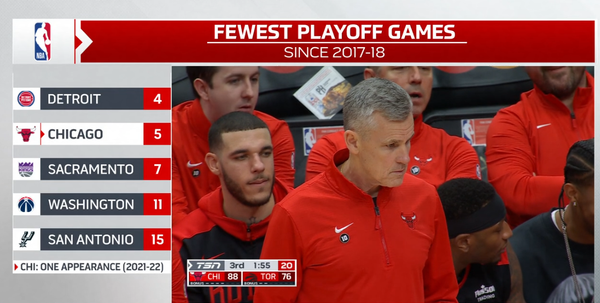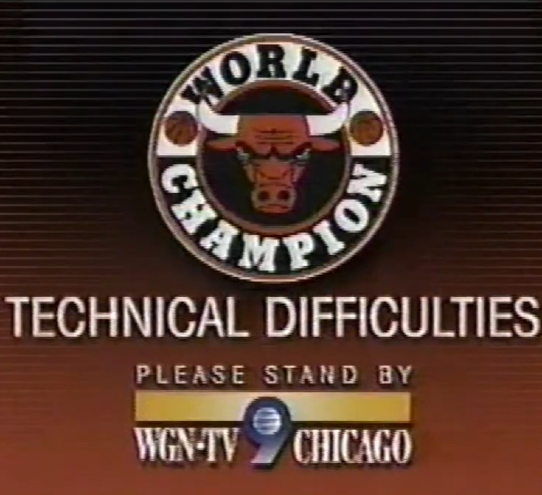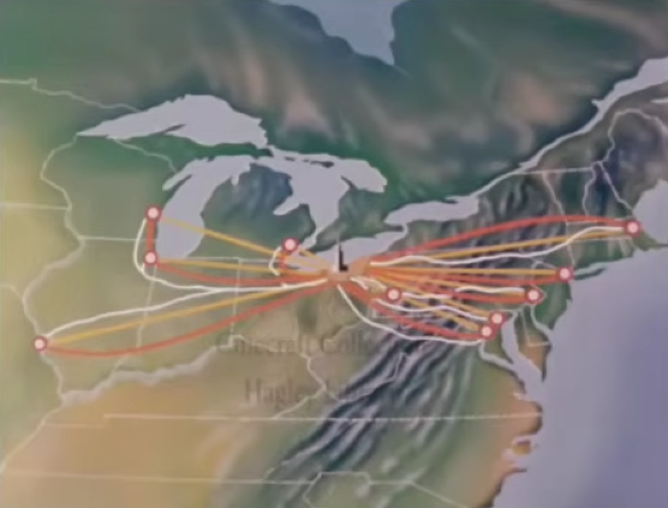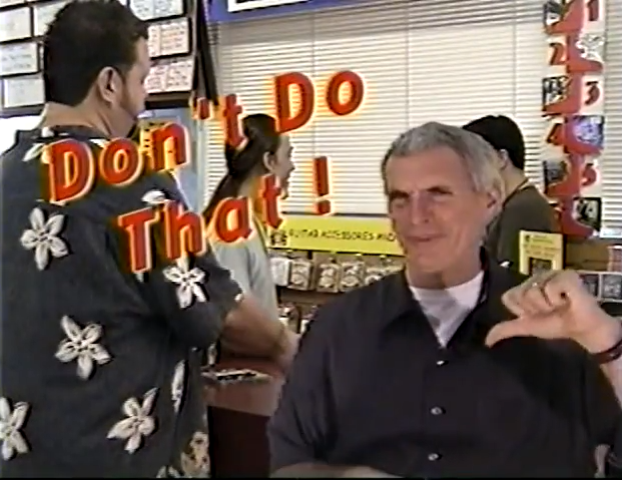NBA offseason winners, loser
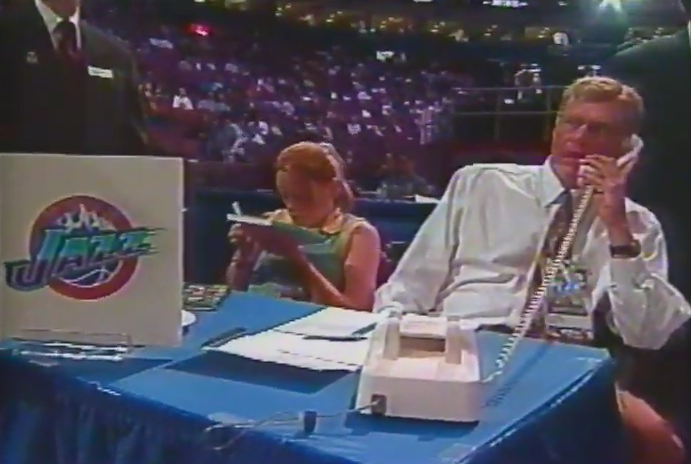
Before we cap the offseason, another three-team boost!
The Clippers traded Norman Powell and didn't do it for a future first-round draft pick (whom will enter seventh grade in a few weeks).
The Miami Heat pick up Norm, good basketball there. Clippers pick up John Collins, ex-Jazz, good basketball, there. Utah acquires Kyle Anderson, good basketball there. Kevin Love is traded to Utah and potentially becomes a new free agent via buyout, good vibrations there.
Kevin's uncle made sure of it. Sued for those rights.
Please subscribe for independent hoop writing but also to help me buy tickets to watch Mike Love at a minor league ballpark. I want to hear Mike's side of the story.
THREE-TEAM TRADE GRADES
Utah earns five out of five stars, using the system Mrs. McFarlin graded us with in seventh grade English. She was kinda flamboyant.
Anderson will absolutely help Utah's offense and locker room and Will Hardy's ongoing credibility in the clubhouse. Anderson is also a solid trade deadline contract to work with, and Utah also picks up L.A.'s 2027 second-round pick. Ace Bailey gets shots up quicker than anyone else and Anderson declines shots slower than anyone else, Rutgers and UCLA, it is a perfect match.
Plus a $25.3 million trade exception handed to a brand-new, hopefully overeager, general manager. A GM who could trade into cap space later this summer.
Was Austin Ainge supposed to take over the Jazz two years ago, and that's why they've treaded water for so long? Was this like when the Pistons had to wait forever while ownership changed hands? Either way, Jazz fans fill that arena and yell loudly, that court deserves a winner.
Miami earns a NORM, like the character from that episode of Wings:
Norman Powell looks like one of those guys that wants to eat bean curd and run on the beach in the dark with weights Velcroed onto his limbs, and play ball until he is 39. Miami is the best place to do this, according to those handful of 'Miami Vice' repeats I saw on cable 23 years ago, although I don't think those were weights.
Norm Powell doesn't turn 33 until next May and his contract expires next June, the Heat can extend him into life as a Super Alec Burks.
Immediately, he'll be an expert replacement for both Duncan Robinson and Anderson and Burks. When a player is good and can play a lot of minutes without a coach's reflex, that player can replace a lot of players.
John Collins paws the ball and scores with it and he's waited so, so, long for the chance to do it in moments which count. Collins wants to make up for that slow start to the Boston series in 2023, Utah didn't help with this part of his character's story, but Los Angeles will.
I give the Clippers an L and an A.
Bradley Beal and Chris Paul next? The Clippers already boast three players representing the 2013 All-Star Weekend (Brook Lopez and James Harden were All-Stars, Kawhi Leonard on the Rising Stars), why not add two more?
SPURS STAY SHARP
Update: The San Antonio Spurs signed Luke Kornet to a four-year, $41 million deal, which descends, is fully guaranteed the first two years for $21.45 million, has a third-year $2.55 million partial guarantee salary and a fourth-year non-guaranteed salary, sources told @hoopshypeofficial.bsky.social.
— Michael Scotto (@mikeascotto.bsky.social) 2025-07-07T18:02:02.128Z
Suddenly the only thing to worry about with Luke Kornet's contract drew into a big POOF.
And when POOF's dust settled the Spurs found themselves with another trade chip, saving a swap partner $7.225 million in 2027-28 if Kornet's final two years are at $9.55 million per season.
Then I read this and liked Luke even more:
Wish him the best. That's the modern day Stromile Swift the Spurs just got
— MrQuindazzi (@mrquindazzi.bsky.social) 2025-07-07T19:40:23.856Z
WINNERS
The Southeast.
Atlanta could roll for four rounds. Orlando set itself up for a chance at the Finals with a chip-shouldered rookie and a holdover point guard with a chip twice as sharp, plus the new short-armer leading the way. Charlotte slowly regained credibility.
Atlanta, ORL, Charlotte, and then Cam Whitmore traded to Washington? Babies, basketball at 7:00 PM is back!
Charlotte has four future firsts incoming plus all its own first-round draft picks to trade. They are a deal away from winning now and without resolving LaMelo Ball's future, the 24-year old could move in and out of the lineup again and Charlotte could still win enough to push for the postseason. LaMelo will be yelled at by Spencer Dinwiddie and if Ball is bothered by this, he'll have to watch Collin Sexton move on ahead and score the ball efficiently without him.
Ball will either show up and eventually give good two-way effort the best way he knows how, or he'll push back. He's no chump, it'll be the former.
Tre Mann and Pat Connaughton are not great, but you shoulda seen the last guy. Charlotte swapped out Mark Williams for Mason Plumlee and tried to act like we didn't notice.
Last year's lottery pick? Still 19, and Tidjane Salaün sat around Taj Gibson all 2024-25. Kon? Still 19. These guys will learn to play the game together, Charlotte has a chance to correct this whole century (of Charlotte pro basketball).
Zaccharie Risacher? Turned 20 in April, so Atlanta collected a roster ready to take every bit of pressure off him as required. Yet the roster remains permeable enough for Zaccharie to confidently pick his spots.
New Hawk Nickeil Alexander-Walker doesn't need to be markedly better in 2025-26, he only needs to be himself, compete and make appropriate decisions quickly. ATL did its work with trade exceptions, building off the dry powder held over from previous administrations, the ones who held off on taking in some random first-round pick for Clint Capela at a trade deadline. Atlanta didn't simply make strong moves relative to the weakened East, Atlanta made fantastic moves in any context.
Washington picked up Tre Johnson, 6-5 coach's kid, elbow under the ball before he was done eating wearing his bib. Ace Bailey would be nice to take a chance on, but now the Wizards don't have to worry about a Big Story every so often, won't have to fear someone stopping the momentum. There's no way Andray Blatche's name wasn't mentioned in the Wizards' draft room after Utah snapped Bailey.
And, yes, "momentum." For all three teams. Nobody here was caught doing dumb things. Nobody rang the bell for a one-year run to 45 wins and if everything goes perfectly and in the East.
What we said about 7:00 PM, we meant. Our life is devoted to League Pass, and I'm tired of watching good-hearted high-definition southerners plop money down for tickets, bust tail to the arena to view a contest that's over (by design) at 7:42. I get to flip to the Knicks game, but they're stuck there all evening. Wondering where all the money goes during "rebuilding," hating themselves for gawking at their phone during the live NBA action they paid so dearly for (plus parking), reading Dan Quinn's Wednesday quotes during a bye week because the Wizards are down 72-48.
But now, Washington gets a team. Charlotte gets its sting. Atlanta burnishes what should already be one of the NBA's crown jewels, not its spinning symbol of mediocrity.
The Wizards' veterans – Marcus Smart and C.J. McCollum and Khris Middleton and maybe Malcolm Brogdon – they'll all miss 27 games, but not at the same time. Trade rumors abound and could distract, sure, but not this group. They're all grownups, trying to secure the win-win-win-win.
Washington's way doesn't have to be How To Do It, but individual emphasis can find future homes for these missing pieces, vets securing bags and postseason relevance at the same time. Wizards earning the dual benefit of time spent together learning with players (veterans can teach a front office a thing or two, too), and whatever compensation or cap relief received in any agreement.
Did I just explain why teams trade? It can be this dumb, not some thought revolution. Any Washington success shouldn't require every team should going there, trading everything for Tristan Thompson and the Morris Twins and Damion Lee and Royce O'Neale and Torrey Craig all at once.
But Washington went there. Now go further, Wizards, boldly.
LOSER
Me, for writing this.
Every new owner that jumps into the NBA, every middle class player earning a fair deal, it only increases our chances at a lockout. Once these new hotshit dipshit owners get a text thread going, it is all over.
And Adam Silver wants nothing to do with stopping them and instead encourages them because
- They embody a sizable portion of the 30 organizations Adam Silver was hired to represent.
- A few of them brought up "AI."
Listen, I always think they'll lock the players out at the end of the NBA's next Collective Bargaining Agreement. I think it'll happen the next time every time and I think it'll happen the next time.
I'm a little scarred from surgery when I was a few days old and also watching the greatest and largest free agent class in NBA history lose a chance at what shoulda been the Great Free Agent Frenzy of 1998.
Instead, after a lockout, it became the Hefty Free Agent Hump of Late January '99.
That's Bob Costas taking his baseball gripes out on basketball, but it is an interesting if borderline-unrelated snapshot. I believe the largest percentage of player contracts expired after 1997-98, making the 1998 free agent class the largest in history.
The reason there were so many expired contracts dangling is that the NBA planned on locking out its players out in 1998 the second the NBA signed its 1995 Collective Bargaining Agreement. The document which made unrestricted free agents out of players seeking a fourth year of NBA employment.
Unrestricted free agency in an era where any hotshit dipshit – James Dolan was about to take over the Knicks – could offer a $100 million per season deal. The NBA knew it had to enact restrictions to its salary cap and what's another word for colluded to keep any new agreements from hitting until after the 1998 lockout, when teams could sign the players for cheaper terms under new rules.
It cost the Suns Antonio McDyess, for whom the Suns traded three first-round and two second-round picks to Denver in October 1997, ahead of the lockout.
The Suns had a chance to take McDyess out of the 1998 free agent pool by offering him an appropriate contract extension during the afternoon they traded for him. But Phoenix passed, declined to extend him before that evening's deadline, the Suns front office understanding Phoenix could offer McDyess more money than anyone else after an owner-induced work stoppage.
More money than competitors, but far less money than the current going rate: McDyess' pre-lockout merits were in the ballpark of Kevin Garnett's rejected three-year, $103 million contract.
Suns owner/GM Jerry Colangelo was a massive lockout proponent, Reinsdorf-guy, and pushed for the cake and all the trimmings. A lockout to save salary, then the ability to bend the rules a bit once the lockout wrapped in Jan. 1999, clearing cap space to sign free agent vets while holding McDyess' Bird Rights, then signing Antonio.
Look at what McDyess professed in Jan. 1998, a year before re-joining the Nuggets:
"That's the biggest fib I've heard this year. I don't think there's any possible way I would go back to Denver," McDyess said.
One year and 19 days after the publication of that column, Antonio McDyess "would go back to Denver."
A free agent deal, not a sign-and-trade with the Nuggets. Jerry Krause was days away from inventing sign-and-trades, so McDyess made less in Denver (six-years, $67.5 million in Willennium money) than what Phoenix offered with Bird Rights (six and $71 million).
If free agency were in July with no lockout, does McDyess remain a Sun?
"I like it here in Phoenix. I just want to play and I want to be here. For how much money, I can't answer that right now. ... I'm a small-country guy and I plan on staying that way. I don't let my ego get in the way."
My point? I drove through Antonio McDyess' hometown of Quitman, MS on my way from New Orleans and toward Game 4 of the 2025 Eastern finals and Antonio is right, he is just a small-country guy.
NBA sports team ownership used to be about the prestige, the tax write-off, maybe a little competitive flair. New NBA owners expecting their businesses to act like businesses is not the end of the world, nor even unappealing, but new NBA owners aren't into treating businesses like businesses anymore. People with enough money to buy an NBA team in 2025 will be the type to think a business is in place to change the world, all that Steve Jobs grabass, and changing the world should obviously result in perpetual, exponential growth.
Nah, not here, not with the feet of 7-footers.
Maybe Adam Silver thinks he finally has these finances capped. I don't know what his predecessor thought as he bargained for salary cap changes every few years, if David Stern truly imagined his CBA as watertight. I wonder if Silver feels this way, now that the kettle's draped with aprons. He should feel proud, a new streaming deal and another round of CBA negotiations conducted with little consternation from either side.
What he will feel soon, whether these new owners find themselves rendered inert or inspired within this new CBA, is the buzz of the phone. Same as Stern heard, always a handful of New Guys ringing to ask why it has to be this way. Every incoming NBA owner from the 1980s onward complained as much if not more than Mark Cuban, Cuban was the only one who always wanted his own TV show so he skimmed off and leaked the occasional basketball complaint to build his populist appeal.
These owners are tempestuous, they will demand turnover and they will demand it on whichever day starting with T was last, not next, because they've been up this whole time on some "natural" stimulant called Teēe and do not know what day it is. They're the new billionaires, and boy do they suck.
They are for Adam Silver to support, not get in front of. Adam Silver does not have the best interest of the game to defend because this isn't a game to him, but a business, and Adam Silver's job is to protect his particular business whether they play a sport or not.
We think wild free agency is dead, capped, back-to-back titles banished outside a once-in-a-million collection like OKC's. We see larger and larger contract extensions and that teeming streaming deal.
New NBA owners won't see it that way, they won't see a leveled field to outwit and open title opportunities. They'll only spot larger and larger losses than expected and notice that winning doesn't come easy because unlike in business, owners can't rig NBA wins.
Because they are so smart, their idea will be the one to fix the former point. They'll call it "formal" but mean "former" and nobody notices or at least says anything which is good, because discussing ladder points will only confuse everyone.
When the idea flames out in committee, as tends to happen to dumb things spoken out loud, they'll resort to what's always worked. Keep the labor out of office until it agrees to shittier terms.
They will do this not because it has succeeded for time immemorial or because the political atmosphere seems riper than ever for fans to side with management, nah, they will do it because they think they thought of it first.
Like I said, smart. Why else would they have all this money?
JERRY KRAUSE INVENTED SIGN-AND-TRADES
I think so.
Before the 1999 Collective Bargaining Agreement there were no salary limits for free agent signings or extensions, it was whatever you could fit under the cap (Shaq, 1996) and whatever you wanted to pay your free agents over the soft salary cap (MJ, 1996 and 1997) with Bird Rights. The 1999 CBA introduced max salaries, and a clampdown on the amount free agents could sign with a new team for, less than what they'd earn with Bird Rights from their incumbent team.
It was an incentive that more or less created the free agency we watch today. The free agency we don't watch today, with every player re-signing with their teams for as much money from possible and asking questions like "where do you want to trade me?" and "how soon will you trade me?" later.
Somebody in Krause's office, maybe Jerry, realized that instead of letting prominent Bulls free agents sign with new teams under cap space, why not help these departing champions make as much money as possible with their new teams?
And, you know, maybe get a little back.
The Bulls and the new club would agree on an exact cap number so as to deal without complication and the new club would return either seat-filler in Krause's upcoming tank season, or a tasty first-round pick a team didn't want to keep because they were too damn cheap.
It wasn't simply for max deals. Look at what Krause did for Steve Kerr, signing Steve to a million-buck raise to $1.774 million, the beginning of a five-year, $11 million deal with San Antonio. And look at what Krause did for himself in the sign-and-trade, earning a future Spurs first-rounder and the always considerate "cash considerations."
Plus Chuck Person from San Antonio, and the ability to waive Chuck Person after what Chuck Person did in Chicago Stadium:
The Bulls received the No. 24 pick in the 2000 draft from the Spurs and used it on an Estonian fella, 7-footer Dalibor Bagarić, a nice guy who could not stay in front of me.
This isn't a joke.
In 2001 I tried to move around Dalibor Bagarić in the Bulls locker room and Dalibor Bagarić tried to move around me and I beat Dalibor Bagarić to the spot.
The cash Chicago earned from the sign-and-trade left Jerry Reinsdorf's hands quicker than Dalibor Bagarić made it from one side of the paint to the other.
For signing and trading Luc Longley to a six-year, $32.4 million contract with the Phoenix Suns, the Bulls received Mark Bryant (who started half the 1999 season at center for Chicago, working more games and minutes than Longley did in Phoenix that season), plus Martin Müürsepp (waived).
Also Bubba Wells, released by Chicago 13 months after doing this to Chicago:
I mentioned Colangelo as cheap, and yes, he was. He traded Steve Nash just before the 1998 lockout started so the Suns didn't have to pay Nash a second contract, landing Dallas' eventual No. 9 selection in the 1999 draft to add to the Suns' own at No. 16.
After netting Luc and signing free agent Tom Gugliotta (six-years, $58.5 million), Colangelo wanted off the salary of his lesser first-round choice. Even if, with the 1999 CBA, first-round picks were as cheap as ever and now under team control for four seasons before restricted free agency (RFA previously banished in the 1995 CBA). The Suns threw their next first-round pick in the Longley sign-and-trade and the Bulls were able to draft Metta World Peace.
Metta made only $1.079 million in the first season of his rookie deal, but then again he would have paired at forward with Shawn Marion to change the game of basketball forever.
To sign-and-trade Scottie Pippen into Houston's max cap space, the Bulls earned future assistant coaching legend Roy Rogers and a conditional second-rounder (Jake Voskuhl, taken No. 33 in 2000) to let Houston live with Pip.
Eight months and one week later, Pip asked out of Houston ahead of the 1999-00 season, traded to Portland for six beautiful 1990s names: Walt Williams, Kelvin Cato, Stacey Augmon, Carlos Rogers, mini-scorer Ed Gray, and Brian Shaw, immediately waived by Houston, and that's how the Bulls gave the Lakers the 2000 title.
WICKED MESSENGER
Indiana next, thank you for reading!


